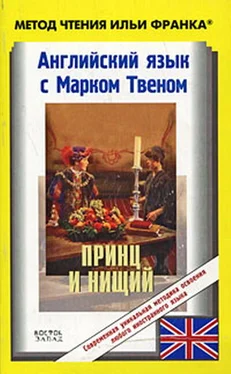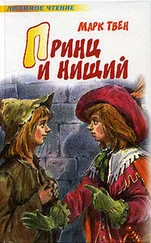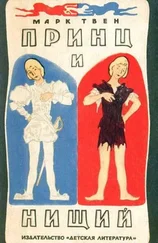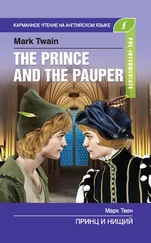All the company wondered at this speech (все собрание удивилось этой речи), and wondered still more (и удивилось еще больше) to see the little mendicant pick out this peer (увидеть, как этот маленький попрошайка выбрал: «взял наружу» этого лорда) without hesitancy or apparent fear of mistake (без колебания или заметного страха ошибки), and call him by name (и назвал его по имени) with such a placidly convincing air (с таким безмятежно убедительным видом; to convince — убеждать) of having known him all his life (/словно/ он знал его всю свою жизнь). The peer was almost surprised into obeying (лорд был почти удивлен в послушание = так удивился, что чуть не послушался). He even made a movement as if to go (он даже сделал движение, как если бы идти), but quickly recovered his tranquil attitude (но быстро восстановил свою спокойную позу) and confessed his blunder with a blush (и выдал свой промах краской = покраснел). Tom Canty turned upon him (Том Кэнти повернулся к нему) and said, sharply (и сказал резко):
'Why dost thou hesitate (почему ты колеблешься; dost — устар. делаешь)? Hast not heard the king's command (разве ты не слышал приказ короля; hast = have thou)? Go (иди)!'
The Lord St. John made a deep obeisance (лорд Сент-Джон отвесил глубокий поклон) — and it was observed (и было замечено = заметно) that it was a significantly cautious and non-committal one (что это был весьма осторожный и ни к чему не обязывающий поклон: «один»), it not being delivered (который не предназначался: «он не будучи сделан») at either of the kings (ни одному из королей), but at the neutral ground (но нейтральному пространству: «земле») about half-way (примерно на полдороги) between the two (между двумя) — and took his leave (и удалился: «взял свой уход»).
commune [`kOmju:n], dynasty [`dınəstı], artisan [a:tı`zæn], remote [ri`mqut]
The tide was turning very fast now, very fast, indeed — but in the wrong direction; it was leaving poor Tom Canty stranded on the throne, and sweeping the other out to sea. The Lord Protector communed with himself — shook his head — the thought forced itself upon him, 'It is perilous to the state and to us all, to entertain so fateful a riddle as this; it could divide the nation and undermine the throne.' He turned and said:
'Sir Thomas, arrest this — No, hold!' His face lighted, and he confronted the ragged candidate with this question:
'Where lieth the Great Seal? Answer me this truly, and the riddle is unriddled; for only he that was Prince of Wales can so answer! On so trivial a thing hang a throne and a dynasty!'
It was a lucky thought, a happy thought. That it was so considered by the great officials was manifested by the silent applause that shot from eye to eye around their circle in the form of bright approving glances. Yes, none but the true prince could dissolve the stubborn mystery of the vanished Great Seal — this forlorn little impostor had been taught his lesson well, but here his teachings must fail, for his teacher himself could not answer that question — ah, very good, very good indeed; now we shall be rid of this troublesome and perilous business in short order! And so they nodded invisibly and smiled inwardly with satisfaction, and looked to see this foolish lad stricken with a palsy of guilty confusion. How surprised they were, then, to see nothing of the sort happen — how they marveled to hear him answer up promptly, in a confident and untroubled voice, and say:
'There is naught in this riddle that is difficult.' Then, without so much as a by-your-leave to anybody, he turned and gave this command, with the easy manner of one accustomed to doing such things: 'My Lord St. John, go you to my private cabinet in the palace — for none knoweth the place better than you — and, close down to the floor, in the left corner remotest from the door that opens from the antechamber, you shall find in the wall a brazen nail-head; press upon it and a little jewel closet will fly open which not even you do know of — no, nor any soul else in all the world but me and the trusty artisan that did contrive it for me. The first thing that falleth under your eye will be the Great Seal — fetch it hither.'
All the company wondered at this speech, and wondered still more to see the little mendicant pick out this peer without hesitancy or apparent fear of mistake, and call him by name with such a placidly convincing air of having known him all his life. The peer was almost surprised into obeying. He even made a movement as if to go, but quickly recovered his tranquil attitude and confessed his blunder with a blush. Tom Canty turned upon him and said, sharply:
'Why dost thou hesitate? Hast not heard the king's command? Go!'
The Lord St. John made a deep obeisance — and it was observed that it was a significantly cautious and non-committal one, it not being delivered at either of the kings, but at the neutral ground about half-way between the two — and took his leave.
Now began a movement (теперь началось движение; to begin — начинаться) of the gorgeous particles of that official group (разноцветных/ярких частичек этой придворной группы; gorgeous — пышный, великолепный) which was slow, scarcely perceptible (которое было медленным, едва заметным), and yet steady and persistent (и все же устойчивым и постоянным) — a movement such as is observed in a kaleidoscope (движение такое, как наблюдается в калейдоскопе) that is turned slowly (который крутится медленно), whereby the components of one splendid cluster (вследствие чего части одного прекрасного скопления) fall away (распадаются) and join themselves to another (и соединяются в другой) — a movement which (движение, которое), little by little (мало-помалу), in the present case (в настоящем случае), dissolved the glittering crowd (рассеяло сверкающую толпу) that stood about Tom Canty (которая стояла вокруг Тома Кэнти; to stand — стоять) and clustered it together again (и собрала ее вместе снова) in the neighborhood of the new-comer (в соседстве = рядом с новоприбывшим). Tom Canty stood almost alone (Том Кэнти стоял почти один). Now ensued a brief season (теперь последовало короткое время) of deep suspense and waiting (глубокого беспокойства и ожидания) — during which (в течение которого) even the few faint-hearts (даже немногие малодушные люди) still remaining near Tom Canty (все еще остававшиеся около Тома Кэнти) gradually scraped together courage (постепенно наскребли храбрости) enough to glide (достаточно /для того, чтобы/ скользнуть = незаметно перейти), one by one (один за другим), over to the majority (к большинству). So at last Tom Canty (так что наконец Том Кэнти), in his royal robes and jewels (в своей королевской мантии и драгоценных камнях), stood wholly alone (стоял совсем один; to stand — стоять) and isolated from the world (и отделенный от мира), a conspicuous figure (заметная фигура), occupying an eloquent vacancy (занимающая красноречивую пустоту).
Читать дальше
Конец ознакомительного отрывка
Купить книгу




![Марк Твен - Принц и нищий [Издание 1941 г.]](/books/148799/mark-tven-princ-i-nichij-izdanie-1941-g-thumb.webp)







